Higher, faster, stronger. Those three words are the theme of the Olympic Games. Every two years, the countries do their best to come together and cheer on the world's best athletes. Yet for an institution that tries so desperately to unify the world, it does an amazing job of splitting apart communities.
The Olympics are shrouded in harsh debate in everything from professionalism vs. amateurism to financing. With budgets that balloon out of control to displacement of people and monster environmental footprints, the wariness surrounding this event is not without reason. Yet, few events give a city and a nation so much press and attention for two weeks as the Olympics. With this in mind, the Swiss canton of Graubünden is now working on its formal bid to host the 2022 Winter Games.
The committee behind the bid believed that Switzerland, especially Graubünden, stands to benefit hugely from this event while showing other countries just how one hosts the games right. With the acknowledgment that the games are a long-term investment, the committee is promising that the games will not break the bank, will improve infrastructure in one if the most mountainous cantons and be the most ecologically friendly games ever held.
The claims sound good and if they make it to a vote by Swiss parliament, the odds are good for the bid’s support. However, the people of Graubünden and especially those in Davos and St. Moritz will have the first say this March. If they don't like it, the dream of Graubünden 2022 will remain just that.
The Graubünden 2022 committee has highlighted these seven questions to which their answer is "yes" for each. Mr. Stefan Grass, head of the committee Olympiakritisches Graubünden, has provided the counter arguments to the seven points. This should help you to get a clear understanding of the issues at hand.
1. Are the financial risk under control?
YES — The candidacy can be retracted until the IOC decides on the winner. At that stage, the federal government would take control of the budget for the execution of the games. Meanwhile, parliament on the cantonal and federal level will make all decisions regarding the investment budget. The federal, cantonal, and communal governments will not give up their financial control.
NO — During a candidacy, promises are always made and are always broken. The people of Graubünden need to look at the reality of this bid and what the games would mean, and make their canton’s future a priority.
2. Can we afford these games?
YES — The federal share of the costs for the execution of the games when divided over seven years makes up 2/1000 of the federal budget. For that cost, the canton will receive unparalleled investments in infrastructure, economy, tourism and publicity. Graubünden will not be responsible for any possible deficit, but will reap the rewards of investments for rail, roads and sport.
NO — The costs are gigantic: 2.3 billion Swiss francs for the organization and execution, and 1.5 billion for infrastructure in just a few years. The profits belong to the tax exempt IOC and the deficit of a foreseeable 1.3 billion will be left to the federal and cantonal governments. On top of that, the true costs of the Winter Olympic Games will not be known until the 2022 games are finished. There has already been 250 million francs set aside for security at what is supposed to be a peaceful event, and this budget will not even cover the security costs.
3. Does it make economical sense?
YES — The canton will be able to fill a million extra beds in hotels up to 2022, resulting in additional turnover of 2.3 billion francs. Investments in public transport will make the canton more attractive to visitors and businesses and be advantageous for all industries and regions.
NO — The numbers of the "yes" committee are too high. Statistics of past games show that their economic significance and effect is short-lived around the event, but in the longterm only of marginal importance.
4. Can the environment handle these games?
YES — We have conceptualized the games to fit to the environmental and spacial limits of the region. All of the permanent structures will be built in areas where similar structures already exist or can be renovated. The location of temporary structures will be brought back to their original form and/or even improved after the games. All of the new grounds and structures have been sustainably conceptualized and the work will be done in an ecological fashion.
NO — An event that will draw up to 112'000 guests a day and see 1.5 billion Francs in infrastructure spending cannot be done without the need of intruding on nature. It is simply unavoidable.
5. Can we even organize an event of this magnitude?
YES — We will fit the size of the games onto the size of our canton. By doing this we will ensure less traffic and less environmental damage. We understand Graubünden’s potential and the possibilities available here. Thanks to the World Economic Forum, the FIS Alpine World Ski Championships, and the Euro Cup 2008, we have lots of experience in planning large events.
NO — Smaller, non gigantic Winter Olympic Games that are meant to fit to Graubünden’s size cannot win. The IOC wants big games. We have proven that we can host smaller events that are not like the Olympics: After the success of the FIS Alpine World Ski Championships in 2003, we will be hosting them again in 2017 and in 2013, the Bobsleigh World Championships will take place here. Davos also organizes internationally important events each year, such as the World Economic Forum and the Spengler Cup.
6. Will Graubünden 2022 be different from other Olympic Games?
YES — We are bringing all of the disciplines into the mountains, and via thousands of media channels we will show the world the beauty of our winters. Our arenas and event grounds will be smaller than in previous Olympics. We can guarantee already today that no Olympic ruins will be left behind.
NO — Olympic Winter Games are not sustainable. The minimal longterm economic use of the games are outweighed by the public debts left behind and the serious environmental damage.
7. Will we maintain control of the Games despite contracts with the IOC?
YES — The contracts are negotiated with the IOC before the games are awarded. Should there be criteria that Switzerland does not agree with, the contracts will not be signed. The contracts will also be binding for the IOC and subject to Swiss law.
NO — There is no binding guarantee from the IOC that the basic principles that the people of Graubünden are voting on in March 2013 will not be changed. The contracts between Switzerland and the IOC will be hammered out and finalized after the people of Graubünden vote.
What do you think?
Do you live in a city that has hosted the Olympic Games recently? Did you and your city greatly benefit, or has it left a big hole in your regions coffers? Do you think Graubünden should host the 2022 Olympics? Share your experiences and thoughts below.







If you do not invest into the future you can not expect to improve. In early 1900’s there were more than 20 Sanatoriums in Davos which brought Davos onto the world map and brought many famous writers and artists into this idealic area, which helped our marketing the best way, free through famous books and word of mouth. Also in early and middle of the last century, research institutes started in Davos filling the void from the emptying sanatoriums and bringing new world-wide fame in academia to Davos. The AO Foundation brought our flagship courses to Davos covering a low period for the town and filling lots of hotels and bringing business to restaurants and shops. The WEF also grew in Davos and made Davos famous to the economists of the whole world, bringing more business for the long-term survival of Davos- not just the week that the meeting is hosted.
What is next- clear sporting history that will last this century and beyond. Right from the very beginning of our campaign, GR2022 has been about what can be achieved through the inspiration and power of sport to our youth and their future, using this as a facilitator for positive change and inspiration. GR2022 will require much more detailed planning and preparations to keep the budget down but will improve infrastructure for the benefit of all in Davos and Klosters. The Olympics can give Davos, Klosters, Graubünden and Switzerland huge press and attention for 2x two weeks (Olympics and Paralympics ) across the world- and also for a long time afterwards, the legacy will remain if we show competence in our management of the budget and eco-footprint, but only if you Vote yes to Davos’s future and our Legacy to Davos, Graubünden and Switzerland.
Vote yes to GR2022.
Prof.Dr. Geoff Richards, Director AO Research and Development.
This may now be moot, however I believe that many yearn for the smaller venues of the past now. There is a nostalgia brewing that makes traditional ski resort towns appealing for future Olympic venues. Our experience with Lake Placid shows that, while the excitement and draw of an Olympic village does diminish somewhat over time, there is an element that remains that does indeed affect tourism in a positive fashion. While Lake Placid no longer draws the huge crowds it did, it is still the most profitable town in its area. Real estate prices there are significantly higher than any of the surrounding towns even now, some 30 plus years after its last Games. In addition, the venues that were built are still being used, many of them as training facilities, drawing athletes from all over the world. I would have been very happy to see the Olympics come to Graubunden.